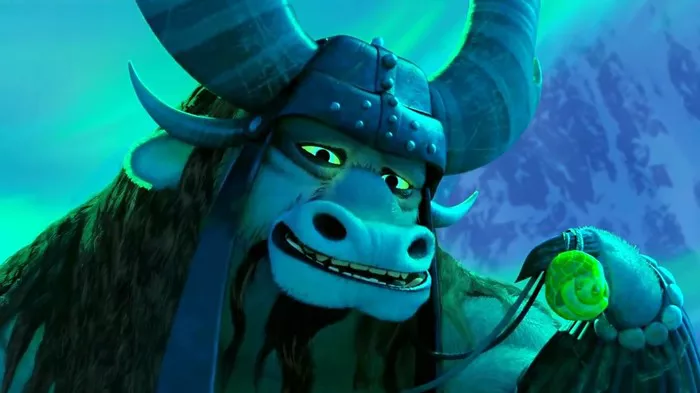In the animated world of Kung Fu Panda, Kai emerges as a formidable antagonist whose quest for power and dominance threatens the very balance of the kung fu universe. As a formidable warrior with a dark past, Kai possesses formidable skills and abilities, yet his reluctance to use the wisdom of Master Oogway remains a puzzling enigma. In this article, we delve into the complexities of Kai’s character and explore the underlying reasons behind his decision not to utilize Oogway’s teachings.
The Rise of Kai: A Tale of Ambition and Betrayal
Kai’s journey begins as a noble warrior and comrade-in-arms to Oogway, the revered founder of kung fu and guardian of the Valley of Peace. Together, they battled side by side, defending the realm from threats both internal and external. However, as Kai’s hunger for power grew, so too did the seeds of jealousy and betrayal.
Driven by a desire to surpass his mentor and claim ultimate supremacy, Kai turned to dark and forbidden magic, ultimately leading to his banishment to the Spirit Realm. It is within this ethereal domain that Kai’s transformation into a vengeful spirit warrior takes place, fueled by his resentment and thirst for revenge against those who wronged him.
The Power of Oogway: A Beacon of Wisdom and Guidance
In contrast to Kai’s descent into darkness, Master Oogway embodies the virtues of wisdom, compassion, and inner peace. Throughout the Kung Fu Panda series, Oogway serves as a guiding light for Po and his fellow warriors, imparting invaluable lessons on the true nature of kung fu and the importance of self-discovery.
Oogway’s teachings emphasize the interconnectedness of all living beings, the power of inner strength, and the importance of embracing one’s true self. His philosophy transcends mere physical combat, offering profound insights into the human (and animal) condition and the path to enlightenment.
The Conundrum of Kai’s Reluctance: A Study in Character Motivation
Given the profound wisdom and guidance offered by Master Oogway, one might wonder why Kai, a once-loyal disciple, chooses not to avail himself of these teachings in his quest for supremacy. Several factors may contribute to Kai’s reluctance:
1. Hubris and Pride: Kai’s fall from grace is rooted in his arrogance and overconfidence. Fueled by a desire to prove himself superior to Oogway and the other kung fu masters, Kai embraces dark magic and forsakes the teachings of his former mentor. His pride blinds him to the wisdom of Oogway’s guidance, leading him down a path of destruction and despair.
2. Resentment and Betrayal: Kai’s banishment to the Spirit Realm serves as a catalyst for his transformation into a vengeful spirit warrior. His feelings of betrayal and abandonment fuel his anger and resentment towards Oogway and the other inhabitants of the mortal realm. As a result, Kai views Oogway’s teachings with disdain, seeing them as a reminder of his own failures and shortcomings.
3. Desire for Dominion: At the heart of Kai’s motivation lies a relentless thirst for power and domination. His quest to amass an army of jade warriors and conquer the mortal realm consumes him, leaving little room for introspection or self-reflection. In Kai’s eyes, Oogway’s teachings are inconsequential compared to the raw power he seeks to wield.
The Redemption of Kai: Finding Inner Peace and Acceptance
Despite his descent into darkness, Kai’s story ultimately serves as a cautionary tale about the dangers of unchecked ambition and pride. In the climactic showdown between Kai and Po, the Dragon Warrior, Kai is confronted with the true power of kung fu: not brute strength or magical prowess, but the strength of the heart and the resilience of the spirit.
In a poignant moment of redemption, Kai is forced to confront the emptiness of his quest for power and the futility of his vendetta against Oogway and his disciples. Through the power of friendship, compassion, and self-sacrifice, Kai finds redemption and inner peace, finally laying to rest the demons of his past.
In the end, Kai’s reluctance to use Oogway serves as a reflection of his own inner turmoil and the choices that define his character. While he may have strayed from the path of righteousness, Kai’s journey reminds us that redemption is always possible for those willing to confront their inner demons and embrace the light within.
Conclusion: The Legacy of Kai and the Wisdom of Oogway
In conclusion, the enigma of Kai’s reluctance to use Oogway is a testament to the complexities of character motivation in the world of Kung Fu Panda. Through his journey from loyal disciple to vengeful spirit warrior, Kai serves as a cautionary tale about the dangers of pride, ambition, and unchecked desire for power.
Yet, amidst the darkness and despair, the wisdom of Master Oogway shines as a beacon of hope and redemption. His teachings remind us that true strength comes not from external power or physical prowess, but from the courage to confront our fears, embrace our flaws, and walk the path of enlightenment.
As we reflect on the legacy of Kai and the wisdom of Oogway, let us remember the timeless lessons they impart: the importance of humility, the power of inner peace, and the transformative potential of redemption. In the end, it is not the strength of our fists, but the strength of our hearts, that defines who we are and shapes our destiny in the world of Kung Fu Panda.


